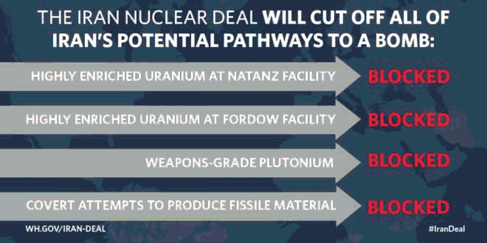WILPF U.S. Statement
Iran Nuclear Deal, August 4, 2015
Iran Nuclear Deal, August 4, 2015
The US Section of the Women’s International League for Peace and Freedom (WILPF) wholeheartedly supports the Joint Comprehensive Plan of Action (JCPOA) aka the “Iran Nuclear Deal,” and strongly urges Congress to vote in favor of the resolution supporting it.
This historic agreement, coming after 20 months of arduous negotiations, paves the way for an improved relationship with Iran – one based on diplomacy and mutual respect. WILPF US joins the United Nations, NATO, the European Union, the Arab League, the National Iranian American Council, and dozens of former ambassadors and analysts who are all heralding this agreement. The New York Times editorial board wrote that the agreement "is potentially one of the most consequential accords in recent diplomatic history, with the ability not just to keep Iran from obtaining a nuclear weapon but also to reshape Middle East politics."
It is noteworthy that Iran has always denied pursuit of the development of nuclear weapons and has long been a signatory to the Nuclear Proliferation Treaty (NPT), while the only nation to oppose the JCPOA, Israel, is not. Furthermore, although they deny it, it is widely known that Israel is in possession of nuclear weapons (estimates ranging from 75 to 400).
WILPF has long called for the elimination of nuclear weapons by all nations. We believe that the use of nuclear weapons is a crime against humanity, and so we reiterate our call for all nations to become parties to, and abide by the provisions of the NPT, and to dismantle any nuclear weapons that they may already possess.
Furthermore, WILPF US calls for the immediate lifting of all economic sanctions, which is considered an illegal collective punishment against the people of Iran. The sanctions have been the cause of immeasurable hardship for the innocent citizens of Iran and are not justified.
For 100 years, the women and men of WILPF have worked internationally to end wars and bring peace to all citizens of the world. WILPF US is gratified that by signing the JCPOA, the United States is taking the path of diplomacy and peace, rather than provocation and conflict. We most strongly urge Congress to vote in favor of the resolution supporting the JCPOA. To vote against it would be a vote for war, would undermine the Executive authority to negotiate treaties on behalf of the United States, and would destroy months of delicate and difficult negotiations. It would also defy the overwhelming wishes and support of the international community.
This historic agreement, coming after 20 months of arduous negotiations, paves the way for an improved relationship with Iran – one based on diplomacy and mutual respect. WILPF US joins the United Nations, NATO, the European Union, the Arab League, the National Iranian American Council, and dozens of former ambassadors and analysts who are all heralding this agreement. The New York Times editorial board wrote that the agreement "is potentially one of the most consequential accords in recent diplomatic history, with the ability not just to keep Iran from obtaining a nuclear weapon but also to reshape Middle East politics."
It is noteworthy that Iran has always denied pursuit of the development of nuclear weapons and has long been a signatory to the Nuclear Proliferation Treaty (NPT), while the only nation to oppose the JCPOA, Israel, is not. Furthermore, although they deny it, it is widely known that Israel is in possession of nuclear weapons (estimates ranging from 75 to 400).
WILPF has long called for the elimination of nuclear weapons by all nations. We believe that the use of nuclear weapons is a crime against humanity, and so we reiterate our call for all nations to become parties to, and abide by the provisions of the NPT, and to dismantle any nuclear weapons that they may already possess.
Furthermore, WILPF US calls for the immediate lifting of all economic sanctions, which is considered an illegal collective punishment against the people of Iran. The sanctions have been the cause of immeasurable hardship for the innocent citizens of Iran and are not justified.
For 100 years, the women and men of WILPF have worked internationally to end wars and bring peace to all citizens of the world. WILPF US is gratified that by signing the JCPOA, the United States is taking the path of diplomacy and peace, rather than provocation and conflict. We most strongly urge Congress to vote in favor of the resolution supporting the JCPOA. To vote against it would be a vote for war, would undermine the Executive authority to negotiate treaties on behalf of the United States, and would destroy months of delicate and difficult negotiations. It would also defy the overwhelming wishes and support of the international community.


